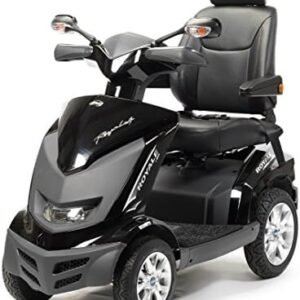In the United Kingdom, mobility scooters play a crucial role in enhancing accessibility and independence for individuals with mobility challenges. These motorized vehicles provide a valuable means of transportation for people who may have difficulty walking long distances or navigating uneven terrain. Let’s explore the significance of mobility scooters in the UK, their benefits, regulations, and the impact they have on users’ lives.
Importance of Mobility Scooters
Mobility scooters are more than just a mode of transportation; they are a lifeline for many individuals. Here’s why they are so vital:
- Independence: One of the most significant advantages of mobility scooters is the independence they offer. Users can move around their communities, visit friends and family, go shopping, and enjoy outdoor activities with greater freedom.
- Improved Quality of Life: By providing access to the outdoors and social activities, mobility scooters contribute to a better quality of life for users. They reduce feelings of isolation and help maintain mental and emotional well-being.
- Accessibility: These scooters are designed to navigate a variety of terrains, including pavements, streets, and indoor spaces, making them highly accessible for users with different needs.
- Safety: Modern mobility scooters are equipped with safety features such as lights, indicators, and comfortable seating, ensuring a safe and secure ride for users.
Benefits for Users
- Ease of Use: Mobility scooters are user-friendly, with simple controls that are easy to learn.
- Comfort: Many models offer comfortable seating and adjustable features to cater to individual needs.
- Versatility: There are various types and sizes of scooters available, from compact models for indoor use to robust ones for outdoor adventures.
- Environmentally Friendly: As electric vehicles, mobility scooters produce zero emissions, contributing to a cleaner environment.
Regulations in the UK
While mobility scooters offer numerous benefits, it’s crucial to adhere to UK regulations to ensure safety for users and pedestrians. Some key regulations include:
- Classifications: Mobility scooters fall into two main categories:
- Class 2: These are smaller scooters designed for pavement use, with a maximum speed of 4 mph.
- Class 3: Larger scooters for road use, with a maximum speed of 8 mph. These must be registered with the DVLA and require tax.
- Age Restrictions: You must be at least 14 years old to drive a Class 2 mobility scooter and 16 years old for a Class 3.
- Insurance: While not mandatory, it’s recommended to have insurance to cover accidents or damage.
- Pavement Use: Class 2 scooters should be used on pavements where available. When using on the road, Class 3 scooters should follow traffic laws.
Impact on Users’ Lives
The stories of individuals who use mobility scooters in the UK highlight the profound impact these devices have:
- Sarah: After experiencing mobility challenges due to arthritis, Sarah regained her freedom with a mobility scooter. She now volunteers at a local charity shop and visits friends without relying on others for rides.
- John: A retired veteran, John enjoys exploring the countryside with his Class 3 mobility scooter. It has allowed him to maintain an active lifestyle and connect with nature.
Conclusion
Mobility scooters are a vital resource in the UK, offering independence, accessibility, and improved quality of life for individuals with mobility impairments. By adhering to regulations and recognizing their significance, we can continue to support the well-being and inclusion of all members of our communities. Whether it’s a trip to the shops, a visit to friends, or a scenic ride through the park, mobility scooters empower users to navigate their world with freedom and confidence.



